- Pay Utility Bill
- Search

Power Sources
Where Does Lehi City Get Its Power?
Lehi City is a member of the Utah Municipal Power Systems (UAMPS) organization which is cooperative of 45 member utilities throughout the Intermountain Region. Each participating UAMPS member chooses which energy resource projects to participate in. The power is then distributed (wheeled) over PacifiCorp’s main transmission system throughout the State. At the present time, Lehi is an owner in and receives energy from the following projects:
Hydro
Jordanelle
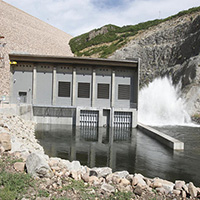
The Jordanelle Hydroelectric Power Plant is owned by the Department of Interior, Central Utah Water Conservancy District, and Heber Light and Power. The operation of this turbine generator hydropower plant began in 2008 and provides Lehi with approximately 4 percent—1.8 megawatts (MW)—of its power.
Colorado River Storage Project (CRSP)
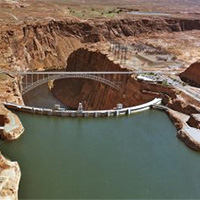 The Colorado River Storage Project (CRSP) is a federally owned and operated project that began in 1956.
The Colorado River Storage Project (CRSP) is a federally owned and operated project that began in 1956.
Providing hydropower to nearby states is one of the purposes of this project. Lehi’s allotment of this federal resource comes from the Flaming Gorge and Glen Canyon Dams and provides Lehi with approximately 3 percent—1.5 MW—of its power.
Wind
Pleasant Valley Wind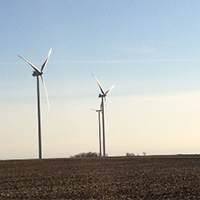
Pleasant Valley Wind Energy Facility is located in Uinta County, Wyoming and has been operating since 2003. Lehi purchases power from this wind farm through a purchasing agreement entered into through the Utah Associated Municipal Power System (UAMPS). Pleasant Valley Wind comprises around 2 percent—.7 MW—of Lehi’s energy.
Horse Butte Wind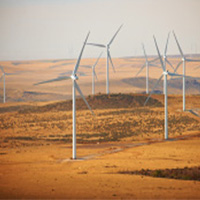
The Horse Butte Wind Farm is located in Idaho Falls, Idaho and consists of 32 turbines. Each turbine is capable of producing 1.8 MW for a total farm capacity of 57.6 MW. Lehi gets approximately 5 MW from Horse Butte, 4 percent of its power.
Coal
Hunter II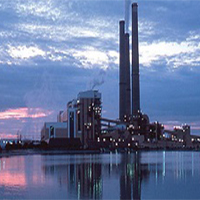
Hunter II, a part of the larger Hunter project, is located in Emery County, UT and has been operating since 1980. This plant is jointly owned by PacifiCorp, Deseret Generation and Transmission Co-operative, and Utah Associated Municipal Power Systems (UAMPS). This coal-fired, steam-electric generating plant provides Lehi with approximately 3 percent—1.5 MW—of its power.
San Juan IV
Located in Farmington, New Mexico, this station is part of the larger San Juan station and has been providing a portion of Lehi’s power since 1994. San Juan IV has been in operation since 1979 and is jointly owned by the Public Service Company of New Mexico, the city of Farmington, New Mexico, M-S-R Public Power Agency, the county of Los Alamos, New Mexico, the city of Anaheim, California, and UAMPS. It currently provides Lehi with approximately 18 percent—10 MW—of its power.
Natural Gas
Nebo Power Plant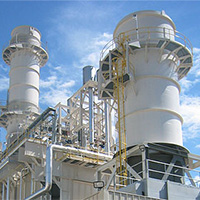
Located in Payson City, UT, the Nebo natural gas plant has a generating capacity of 140 MW. This plant began operation in June of 2004 and includes a natural gas turbine, a heat recovery steam generator, steam turbine, and cooling tower. Lehi receives approximately 30 percent of its power—20 MW—from the Nebo Power Plant.
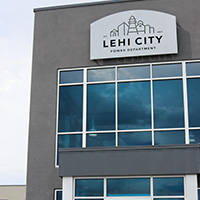
Lehi Generation Peaking Plant
In July of 2018 Lehi installed its first three natural gas generators on site at the Lehi Power Building. Built by Wheeler Machinery, each engine can produce up to 2.3 MW. These generators can ramp up and down economically and are typically used during summer months when power market prices are the highest. The generators are also available to run in the case of natural disasters when the natural gas fuel supply is not compromised.
Heat Recovery
Veyo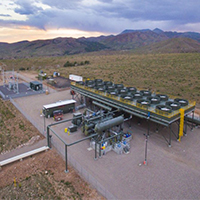
Veyo began commercial operation in May of 2016 and uses heat coming off of the Veyo Compressor Station owned and operated by the Kern River Gas Transmission Company. This heat, that would otherwise be wasted, is used to power the 7.8 MW Veyo Heat Recover Project that gives Lehi around 1 MW.
Power Market
Unplanned Pool
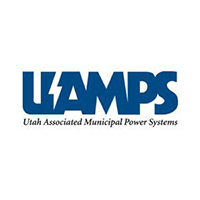
Hour by hour, in order to make Lehi’s resources match up with Lehi’s power needs, Lehi participates in the Unplanned Pool. UAMPS acts as an agent in buying and selling resources for this hourly clearing house, and Lehi purchases approximately 11 percent of its power from it.

